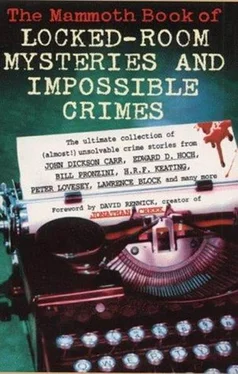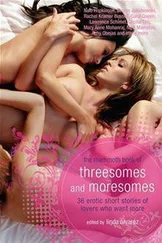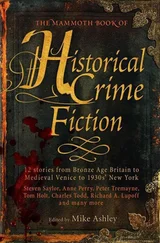Mike Ashley - The Mammoth Book of Locked-Room Mysteries And Impossible Crimes
Здесь есть возможность читать онлайн «Mike Ashley - The Mammoth Book of Locked-Room Mysteries And Impossible Crimes» весь текст электронной книги совершенно бесплатно (целиком полную версию без сокращений). В некоторых случаях можно слушать аудио, скачать через торрент в формате fb2 и присутствует краткое содержание. Жанр: Детектив, на английском языке. Описание произведения, (предисловие) а так же отзывы посетителей доступны на портале библиотеки ЛибКат.
- Название:The Mammoth Book of Locked-Room Mysteries And Impossible Crimes
- Автор:
- Жанр:
- Год:неизвестен
- ISBN:нет данных
- Рейтинг книги:3 / 5. Голосов: 1
-
Избранное:Добавить в избранное
- Отзывы:
-
Ваша оценка:
- 60
- 1
- 2
- 3
- 4
- 5
The Mammoth Book of Locked-Room Mysteries And Impossible Crimes: краткое содержание, описание и аннотация
Предлагаем к чтению аннотацию, описание, краткое содержание или предисловие (зависит от того, что написал сам автор книги «The Mammoth Book of Locked-Room Mysteries And Impossible Crimes»). Если вы не нашли необходимую информацию о книге — напишите в комментариях, мы постараемся отыскать её.
A new anthology of twenty-nine short stories features an array of baffling locked-room mysteries by Michael Collins, Bill Pronzini, Susanna Gregory, H. R. F. Keating, Peter Lovesey, Kate Ellis, and Lawrence Block, among others.
The Mammoth Book of Locked-Room Mysteries And Impossible Crimes — читать онлайн бесплатно полную книгу (весь текст) целиком
Ниже представлен текст книги, разбитый по страницам. Система сохранения места последней прочитанной страницы, позволяет с удобством читать онлайн бесплатно книгу «The Mammoth Book of Locked-Room Mysteries And Impossible Crimes», без необходимости каждый раз заново искать на чём Вы остановились. Поставьте закладку, и сможете в любой момент перейти на страницу, на которой закончили чтение.
Интервал:
Закладка:
The two policemen were examining the doors, closets and windows of the apartment with, obviously, little success.
There was no fire in the air-tight stove, but the place was suffocatingly close. I opened a window, and leaned against the casement to get a breath of fresh air.
The physician approached me. I muttered something to him indistinctly, for I was partly sick with the peculiar mouldy smell that pervaded the room.
“Yes,” he began, scrutinizing me, “the affair looks very perplexing, as you remark. Professional man, sir? No? Bless me! – beg pardon. Never in my life saw anything that looked so exceedingly like nothing. Thought, at first, ’twas a clear case of suicide – door locked, key on the inside, place undisturbed; but then we find no instrument with which the subject could have inflicted that wound on the neck. Queer. Party must have escaped up chimney. But how? Don’t know. The windows are at least thirty feet from the ground. It would be impossible for a person to jump that far, even if he could clear the iron railing below. Which he couldn’t. Disagreeable things to jump on, those spikes, sir. Must have been done with a sharp knife. Queer, very. Party meant to make sure work of it. The carotid neatly severed, upon my word.”
The medical gentleman went on in this monologuic style for fifteen minutes, during which time Kenneth did not raise his lips from Mary’s fingers.
Approaching the bed, I spoke to him; but he only shook his head in reply.
I understood his grief.
After regaining my chamber, I sat listlessly for three or four hours, gazing into the grate. The twilight flitted in from the street; but I did not heed it. A face among the coals fascinated me. It came and went and came. Now I saw a cavern hung with lurid stalactites; now a small Vesuvius vomiting smoke and flame; now a bridge spanning some tartarean gulf; then these crumbled, each in its turn, and from out the heated fragments peered the one inevitable face.
The Evening Mirror , of that day, gave the following detailed report of the inquest:
“This morning, at eight o’clock, Mary Ware, the celebrated danseuse, was found dead in her chamber, at her late residence on the corner of Clarke and Crandall Streets. The perfect order of the room, and the fact that the door was locked on the inside, have induced many to believe that the poor girl was the victim of her own rashness. But we cannot think so. That the door was fastened on the inner side, proves nothing except, indeed, that the murderer was hidden in the apartment. That the room gave no evidence of a struggle having taken place, is also an insignificant point. Two men, or even one, grappling suddenly with the deceased, who was a slight woman, would have prevented any great resistance. The deceased was dressed in a ballet-costume, and was, as we conjecture, murdered directly after her return from the theatre. On a chair near the bed, lay several fresh bouquets, and a water-proof cloak which she was in the habit of wearing over her dancing-dress, on coming home from the theatre at night. No weapon whatever was found on the premises. We give below all the material testimony elicited by the coroner. It explains little.
“ Josephine Marston deposes: I keep a boarding house at No. 131 Crandall Street. Miss Ware has boarded with me for the past two years. Has always borne a good character as far as I know. I do not think she had many visitors; certainly no male visitors, excepting a Lieutenant King, and Mr Kenneth to whom she was engaged. I do not know when King was last at the house; not within three days. I am confident. Deceased told me that he had gone away. I did not see her last night when she came home. The hall-door is never locked; each of the boarders has a latchkey. The last time I saw Miss Ware was just before she went to the theatre, when she asked me to call her at eight o’clock (this morning) as she had promised to walk with ‘Jules,’ meaning Mr Kenneth. I knocked at the door nine or ten times, but received no answer. Then I grew frightened and called one of the lady boarders, Miss Woods, who helped me to force the lock. The key fell on the floor inside as we pushed against the door. Mary Ware was lying on the bed, dressed. Some matches were scattered under the gas-burner by the bureau. The room presented the same appearance it does now.
“ Adelaide Woods deposes: I am an actress by profession. I occupy the room next to that of the deceased. Have known her twelve months. It was half-past eleven when she came home; she stopped in my chamber for perhaps three-quarters of an hour. The call-boy of The Olympic usually accompanies her home from the theatre when she is alone. I let her in. Deceased had misplaced her night-key. The partition between our rooms is of brick; but I do not sleep soundly, and should have heard any unusual noise. Two weeks ago, Miss Ware told me she was to be married to Mr Kenneth in January next. The last time I saw them together was the day before yesterday. I assisted Mrs Marston in breaking open the door. (Describes the position of the body, etc., etc.)
“Here the call-boy was summoned, and testified to accompanying the deceased home the night before. He came as far as the steps with her. The door was opened by a woman; could not swear it was Miss Woods, though he knows her by sight. The night was dark, and there was no lamp burning in the entry.
“ Julius Kenneth deposes: I am a master-machinist. Reside at No.-Forsythe street. Miss Ware was my cousin. We were engaged to be married next-(Here the witness’ voice failed him.) The last time I saw her was on Wednesday morning, on which occasion we walked out together. I did not leave my room last evening: was confined by a severe cold. A Lieutenant King used to visit my cousin frequently: it created considerable talk in the neighbourhood: I did not like it, and requested her to break the acquaintance. She informed me, Wednesday, that King had been ordered to some foreign station, and would trouble me no more. Was excited at the time, hinted at being tired of living; then laughed, and was gayer than she had been for weeks. Deceased was subject to fits of depression. She had engaged to walk with me this morning at eight. When I reached Clark Street I learned that she-(Here the witness, overcome by emotion, was allowed to retire.)
“ Dr Wren deposes: (This gentleman was very learned and voluble, and had to be suppressed several times by the coroner. We furnish a brief synopsis of his testimony.) I was called in to view the body of the deceased. A deep incision on the throat, two inches below the left ear, severing the left common carotid and the internal jugular vein, had been inflicted with some sharp instrument. Such a wound would, in my opinion, produce death almost instantaneously. The body bore no other signs of violence. A slight mark, almost indistinguishable, in fact, extended from the upper lip toward the right nostril – some hurt, I suppose, received in infancy. Deceased must have been dead a number of hours, the rigor mortis having already supervened, etc., etc.
“ Dr Ceccarini corroborated the above testimony.
“The night-watchman and seven other persons were then placed on the stand; but their statements threw no fresh light on the case.
“The situation of Julius Kenneth, the lover of the ill-fated girl, draws forth the deepest commiseration. Miss Ware was twenty-four years of age.
“Who the criminal is, and what could have led to the perpetration of the cruel act, are questions which, at present, threaten to baffle the sagacity of the police. If such deeds can be committed with impunity in a crowded city, like this, who is safe from the assassin’s steel?”
III
I could but smile on reading all this serious nonsense.
Читать дальшеИнтервал:
Закладка:
Похожие книги на «The Mammoth Book of Locked-Room Mysteries And Impossible Crimes»
Представляем Вашему вниманию похожие книги на «The Mammoth Book of Locked-Room Mysteries And Impossible Crimes» списком для выбора. Мы отобрали схожую по названию и смыслу литературу в надежде предоставить читателям больше вариантов отыскать новые, интересные, ещё непрочитанные произведения.
Обсуждение, отзывы о книге «The Mammoth Book of Locked-Room Mysteries And Impossible Crimes» и просто собственные мнения читателей. Оставьте ваши комментарии, напишите, что Вы думаете о произведении, его смысле или главных героях. Укажите что конкретно понравилось, а что нет, и почему Вы так считаете.










